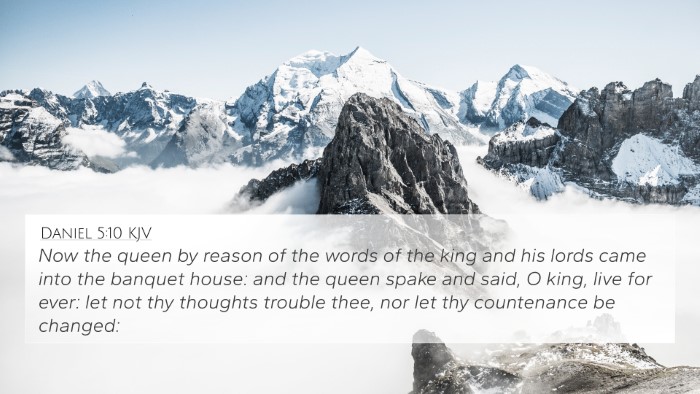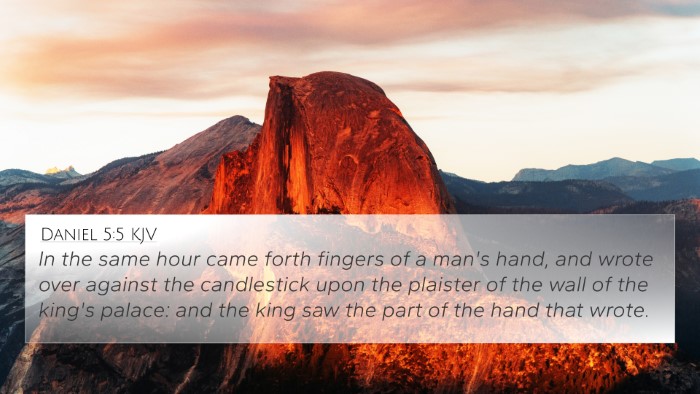Understanding Daniel 4:5
Daniel 4:5 states: "I saw a dream which made me afraid, and the thoughts upon my bed and the visions of my head troubled me."
This verse marks a pivotal moment in the Book of Daniel where King Nebuchadnezzar experiences a troubling dream. The significance of dreams in biblical texts often underscores divine communication, and in this case, it foreshadows future events connected to the king's pride and subsequent humility.
Meaning and Context
This verse illustrates a transformative moment in Nebuchadnezzar's life, where fear and confusion strike. The dream serves as a divine prophecy, reflecting God's sovereignty over kingdoms and rulers. It establishes a theme of divine intervention prevalent throughout the Book of Daniel.
Commentary Insights
-
Matthew Henry: He emphasizes that the dream is part of God's judgment on Nebuchadnezzar's pride. The king's initial fear shows the seriousness of the divine message he received. Dreams, in biblical context, often demand attention and introspection.
-
Albert Barnes: Barnes insists that the dream signifies a warning. The troubling nature of the dream indicates that it is not merely a fleeting thought but is laden with importance regarding the king's reign and the eventual consequences of his actions.
-
Adam Clarke: Clarke highlights the king's troubled state of mind. The intensity of his fear reveals that this is a significant dream meant to convey a critical message about both personal humility and the fate of his kingdom as overseen by God.
Thematic Connections
Daniel 4:5 can be examined through various thematic Bible verse connections. Here are some notable cross-references that enhance our understanding of this verse:
- Job 33:15-16: Discusses God speaking through dreams and visions.
- Joel 2:28: Prophesies about dreams and visions in the end times.
- Genesis 40:8: Highlights the interpreting of dreams as divine messages.
- Daniel 2:1: Nebuchadnezzar had dreams that troubled him before, indicating a pattern.
- Isaiah 53:3: Speaks about the emotions and fear that can reflect divine truth.
- Matthew 2:12: God's communication through dreams is evident in New Testament contexts.
- Hebrews 1:1: God spoke in various ways, establishing a precedent for divine communication.
- Revelation 1:1: God’s message delivered through visions, significant for understanding prophecy.
- Philippians 2:10-11: The ultimate recognition of God's authority acknowledges the link to pride and humility.
Comparative Bible Verse Analysis
Understanding how this verse connects to others involves examining the broader narrative of pride and humility. The theme of God communicating through dreams, as seen in Joseph's story and in various prophetic books, draws a line through biblical history, showcasing how God acts upon human behavior.
The troubling of Nebuchadnezzar aligns with various prophetic messages throughout Scripture. This serves as a cautionary reminder of the divine consequences that arise from ignoring God’s warnings.
Scriptural Cross-Referencing
Identifying connections between Old Testament and New Testament scriptures can deepen understanding. For instance, comparing Daniel 4:5's themes with New Testament teachings on humility, as illustrated in passages like Matthew 23:12, can help clarify the relevance of humility in the face of divine power.
Bible Study Tools for Cross-Referencing
For those engaging in cross-referencing Bible studies, various tools and resources can help analyze such connections:
- Bible Concordance: Provides a comprehensive index of terms to find similar verses.
- Bible Cross-Reference Guide: Helps identify themes and connections between verses.
- Cross-Reference Bible Study: Engages with related scriptures to build greater context.
- Bible Chain References: Links verses thematically for deeper understanding.
Conclusion
Daniel 4:5 serves not only as a historical record of Nebuchadnezzar's experience but also as a timeless reminder of the need for humility before God. Through examining commentary insights and exploring cross-references, readers can grasp the weight of this verse in light of Scripture's broader narrative on pride, vision, and divine sovereignty.









